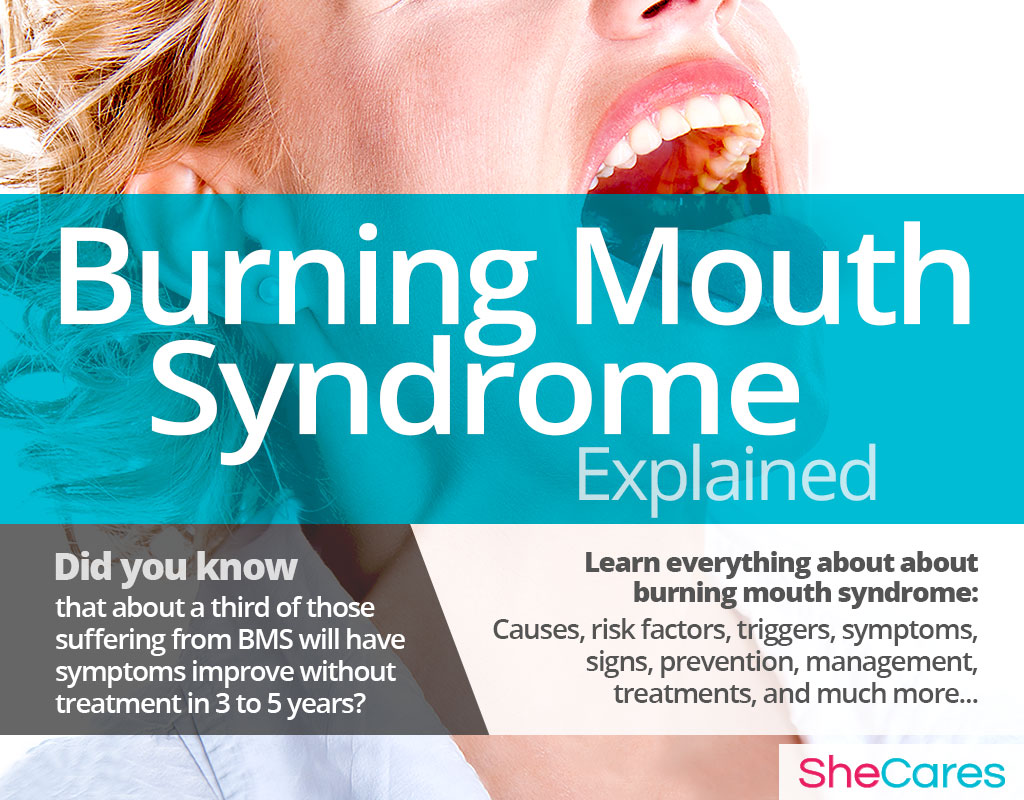About
Quick Facts about Burning Mouth Syndrome
- Burning mouth syndrome is extremely rare in women under the age of 30.
- Up to a third of postmenopausal women may be affected by BMS.
- About a third of those suffering from burning mouth syndrome will improve without treatment in three to five years.
Burning mouth syndrome is described as a recurring burning sensation in the mouth that can affect the tongue, palate, throat, lips, or gums.
Burning mouth syndrome symptoms often happen with no prior notice and for no apparent reason. Although BMS can be attributed as a symptom of varying conditions, a very likely cause may be hormonal imbalance, especially during periods of estrogen deficiency.
Hormonal fluctuations are part of women's lives, taking place monthly with the menstrual cycle and also during certain stages of their reproductive lives, like puberty, pregnancy, post-partum, perimenopause, and postmenopause. These hormonal changes can provoke problems with the taste and sensory receptors of the peripheral or central nervous system, causing burning mouth syndrome.
Identifying Burning Mouth Syndrome
Every woman will have a unique experience of burning sensations on the tongue. Nonetheless, there are three standards that can help classify ways in which this condition may vary: frequency, duration, and intensity.
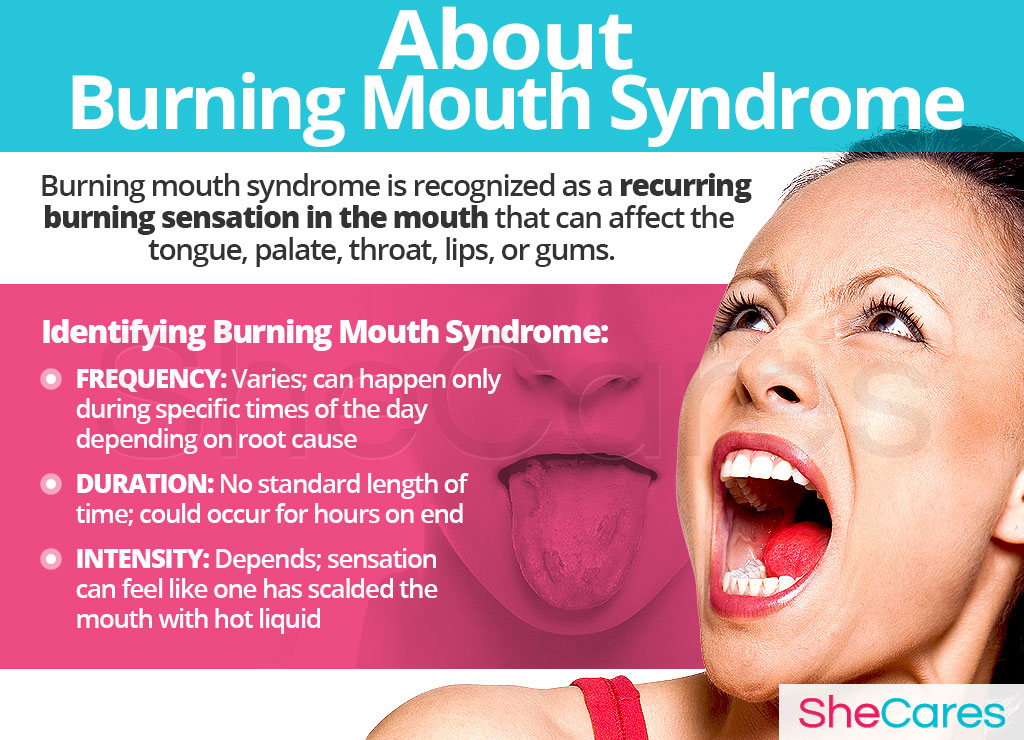
Causes
Learning how to prevent, manage, and eventually treat burning mouth syndrome starts with understanding the condition's underlying cause. Although the exact cause of BMS can be difficult to pinpoint, as it is symptom of many health conditions, women are found to be affected more than men. This leads researchers to believe that the symptom is largely hormonal based.
Hormonal Causes of Burning Mouth Syndrome
There are several systemic and local factors that affect the health of the oral cavity and functioning of its nerves. One of these factors is the homeostasis of hormones in the body.
Receptors for sex hormones have been detected in oral mucosa and salivary glands. Throughout a woman's reproductive life, fluctuations in the sex hormones estrogen and progesterone occur almost routinely and can affect the oral cavity. Therefore, it is accepted that decreased estrogen levels can cause women to suffer from burning tongue and burning mouth syndrome.
Without a doubt, there are various phases within a woman's reproductive life in which it will be more likely for her to suffer from burning mouth syndrome, such as puberty, PMS, pregnancy, post-partum, breastfeeding, perimenopause, and postmenopause.
Other Causes of Burning Mouth Syndrome
Even though hormonal instability is often mainly to blame for burning mouth sensations, experts also mention that BMS may be caused by other factors, including oral conditions and allergic reactions.
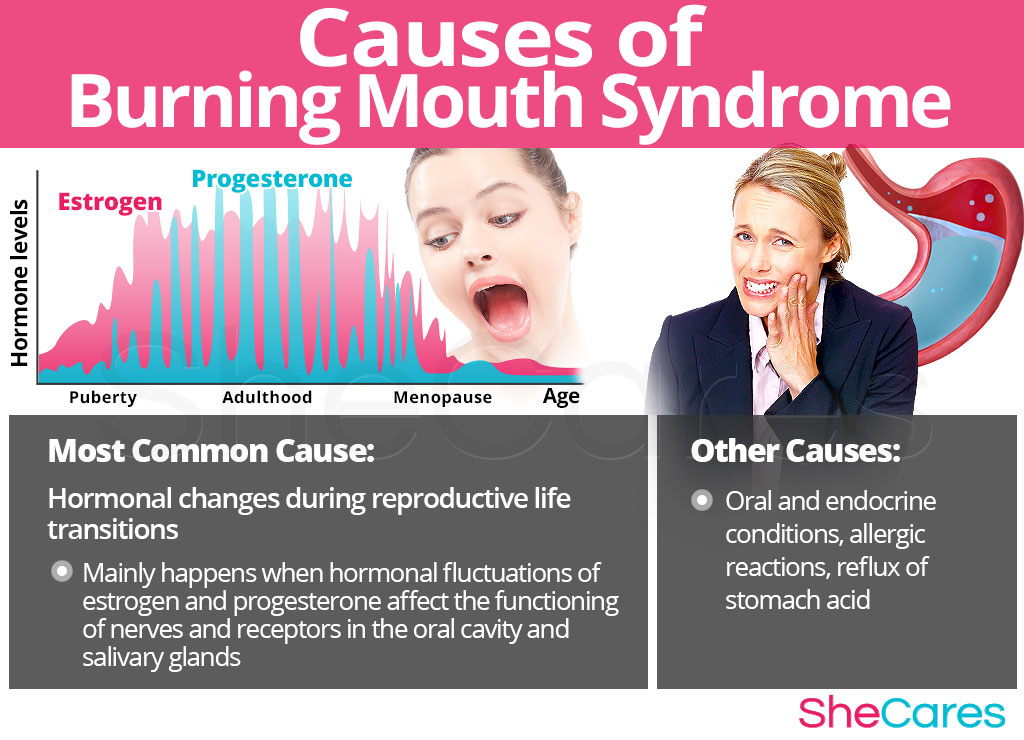
Risk Factors and Triggers
Risk Factors for Burning Mouth Syndrome
Some women have an innately greater chance of suffering from burning mouth syndrome because of physical, behavioral, and psychological reasons, such as age, oral habits, and excessive stress. These predisposing factors can affect a woman's hormone levels and increase the chances of her suffering from burning tongue.
Triggers of Burning Mouth Syndrome
Burning tongue can happen anywhere and anytime. Often, the sensations occur without prior symptoms and without a clear trigger. Therefore, for women who experience recurring burning sensations on the tongue, it would be best to avoid possible triggers, if for even the slightest reprieve. Triggers of burning tongue include consuming spicy and acidic foods as well as using alcohol-containing liquids.
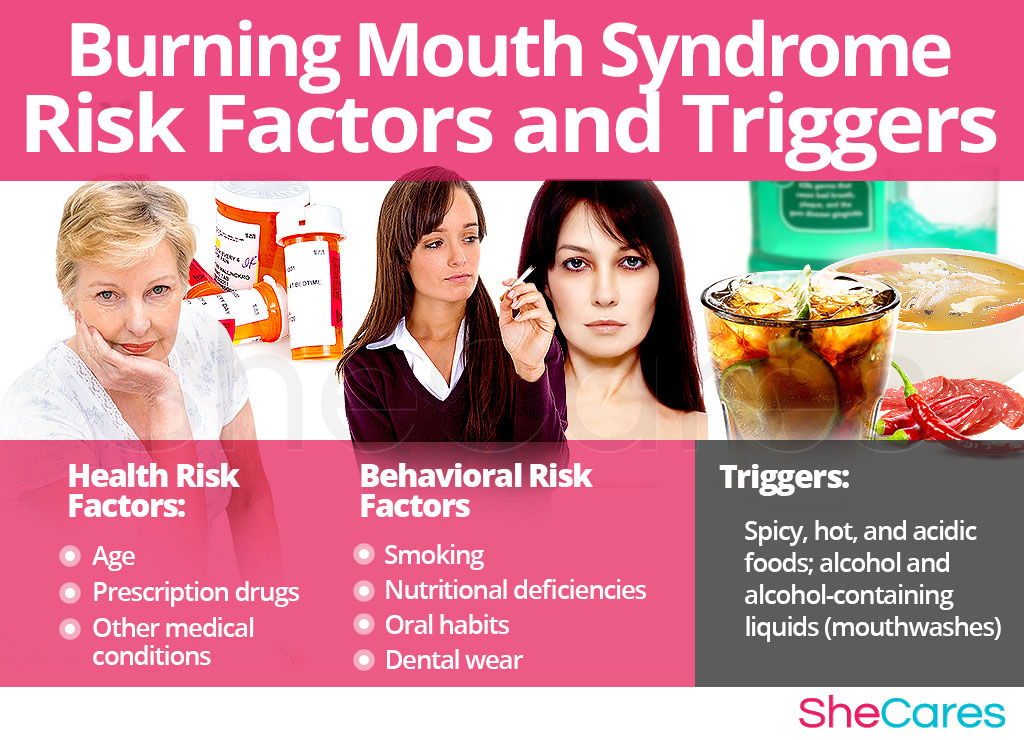
Signs and Symptoms
Burning tongue syndrome can occur throughout women's lives frequently or infrequently, depending on the root cause. Furthermore, how burning tongue syndrome feels from woman to woman will vary as well. Nevertheless, there are some symptoms of burning tongue that are mutual among women suffering from burning tongue syndrome because of hormonal imbalance.
Common Symptoms of Burning Mouth Syndrome
- Loss of taste
- Moderate to severe tingling or numbness
- Altered taste perception (bitter or metallic taste)
- Sensation of dry mouth with increased thirst
- Burning or scalded sensation affecting tongue, gums, palate, lips, throat, or whole mouth
- Oral findings of fungal and inflammatory conditions (geographic tongue, candidiasis, atrophic glossitis, lichen planus)
Signs of Burning Mouth Syndrome
Besides the more noticeable symptoms, medical signs are measurable criteria that are usually assessed by a doctor. The subsequent medical signs will most likely be considered by a doctor when diagnosing a woman with burning mouth syndrome.
- Positive fungal oral cultures
- Elevated fasting blood sugar
- Abnormal blood levels of reproductive hormones
- Decreased levels of vitamins B1, B2, B6, B12, folate, iron, and zinc
- Abnormal thyroid function studies
- Positive serum autoantibodies
Diagnosis of Burning Mouth Syndrome
To diagnose and identify the cause of burning tongue syndrome, a doctor will typically perform four procedures. First, he or she should review the patient's medical history, then conduct a physical exam, and finally do a psychological evaluation. The doctor may order additional tests if necessary.
Complications of Burning Mouth Syndrome
Without a doubt, it is possible for burning mouth syndrome to occur without any apparent reason, as is the case with primary burning mouth syndrome. In these instances of burning mouth, no future intervention is needed if the incidences never happen again. However, for recurring episodes of burning sensations on the tongue, complications can include depression, anxiety, and frequent medical care.
Women suffering from burning mouth syndrome may wish learn how to prevent or manage the condition. Fortunately, there are helpful suggestions and habits that will help them learn how to manage the condition properly.
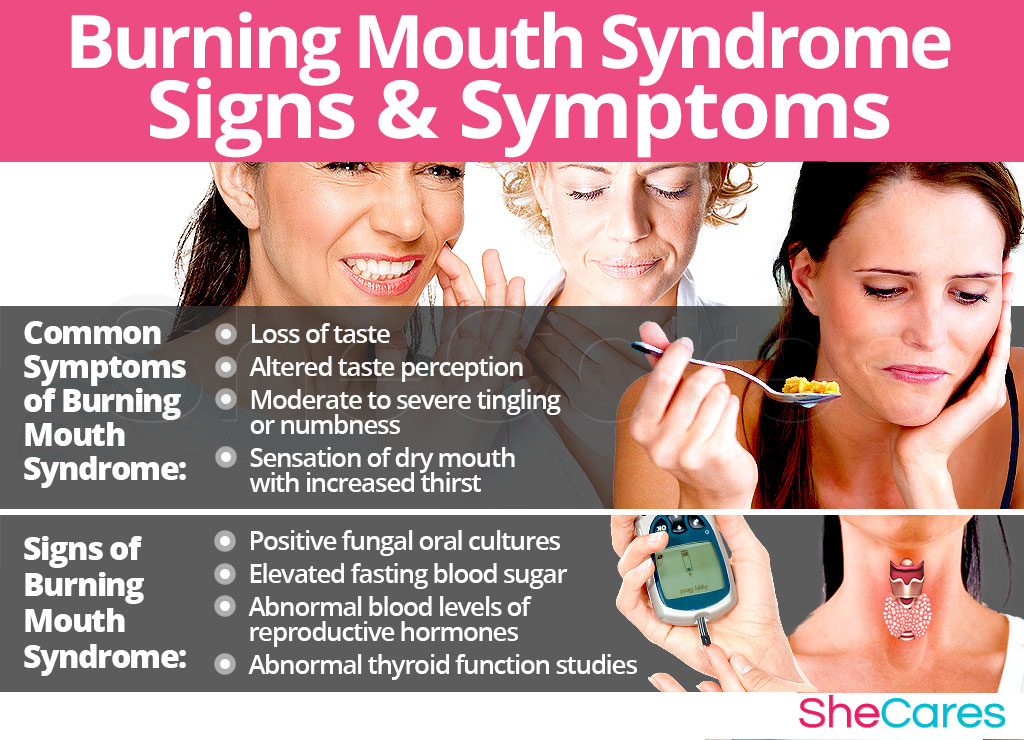
Prevention and Management
Preventing Burning Mouth Syndrome
There is no known way to prevent symptoms of burning mouth syndrome as they can occur out of the blue. However, women have several options available in order to lessen the intensity of another episode or minimize the frequency of them.
Balancing hormones is a crucial step needed to alleviate tongue problems and burning mouth syndrome. Essentials to hormonal equilibrium include following a healthy diet, exercising, and partaking in good habits. Moreover, women are encouraged to support these lifestyle changes by supplementing with essential vitamins proven to ease symptoms of BMS if needed.
Lifestyle Changes for Prevention
Nutrition. When it comes to regulating hormones for overall health, diet is essential. By eating a balanced diet rich in foods known to promote hormonal health - such as phytoestrogens - as well as foods known to sustain nervous system health and help normalize stress, it is possible to reduce the symptoms of burning mouth syndrome.
Regular exercise. Exercise is crucial for women who are looking to manage symptoms of burning mouth syndrome. It reduces stress, maintains alertness, improves cognitive function, and more. When a woman exercises, endorphins are released, which act with receptors in the brain to reduce pain perception. Ideally, women should aim to work out at least 30 minutes a day, 5 days a week. Workouts can include running, swimming, biking, and aerobics. To specifically relieve stress-triggered BMS, practice yoga and deep breathing exercises.
Healthy habits. Studies prove that women who smoke cigarettes and consume alcohol regularly are more likely to worsen symptoms of hormonal imbalance, such as burning mouth syndrome. It is important to avoid or minimize the consumption and use of these substances. Women should also aim to maintain a healthy weight to help balance hormone levels, keep hydrated with water, reduce stress, and sleep at least seven hours a night.
Supplements. Studies indicate that fish oil, B-complex vitamins, zinc, iron, and folate are some of the best supplements needed to help maintain nervous system functions to help cure burning mouth syndrome. This is especially true for those who suffer from burning sensations on the tongue due to vitamin deficiencies. Moreover, the antioxidant alpha-lipoic acid (ALA) is also shown in some studies to be neuroprotective, relieving symptoms of burning mouth syndrome.
Managing Burning Mouth Syndrome
As aforementioned, it is difficult to predict exactly when burning sensations on the tongue will happen as they come out of nowhere. Nonetheless, it is important to make daily changes and avoid triggers to prevent another onset.
Here are some tips and tricks all women can put into practice to manage mouth burns as they are occurring or immediately after in efforts to avoid future occurrences. The management techniques include staying hydrated, chewing gum, sucking on ice cubes, and changing toothpastes.
Furthermore, there are also specific management tips that can be followed by women during puberty, pregnancy, post-partum (including breastfeeding), perimenopause, and postmenopause.
Specific tips for managing burning mouth syndrome during puberty include learning about hormones and visiting the doctor early.
Specific tips for managing burning mouth syndrome during pregnancy include trying pregnancy yoga and solidifying relationships.
Specific tips for managing burning mouth syndrome during post-partum (including breastfeeding) are seeking assistance and setting aside needed personal time.
Specific tips for managing burning mouth syndrome during the menopausal transition (perimenopause and postmenopause) include increasing fluid intake and joining a chronic pain support group.
Alternative Management Tips for Burning Mouth Syndrome
Alternative treatments are also a great way to manage BMS by reducing stress and improving physical and emotional health. Alternative treatments include cognitive behavioral therapy; mindfulness and meditation; and acupuncture.
While these measures may help a woman learn how to better manage her health in efforts to prevent burning sensations from happening again, they are unable to treat the underlying cause of burning mouth syndrome. There are several burning mouth syndrome treatments that can help treat the root causes.
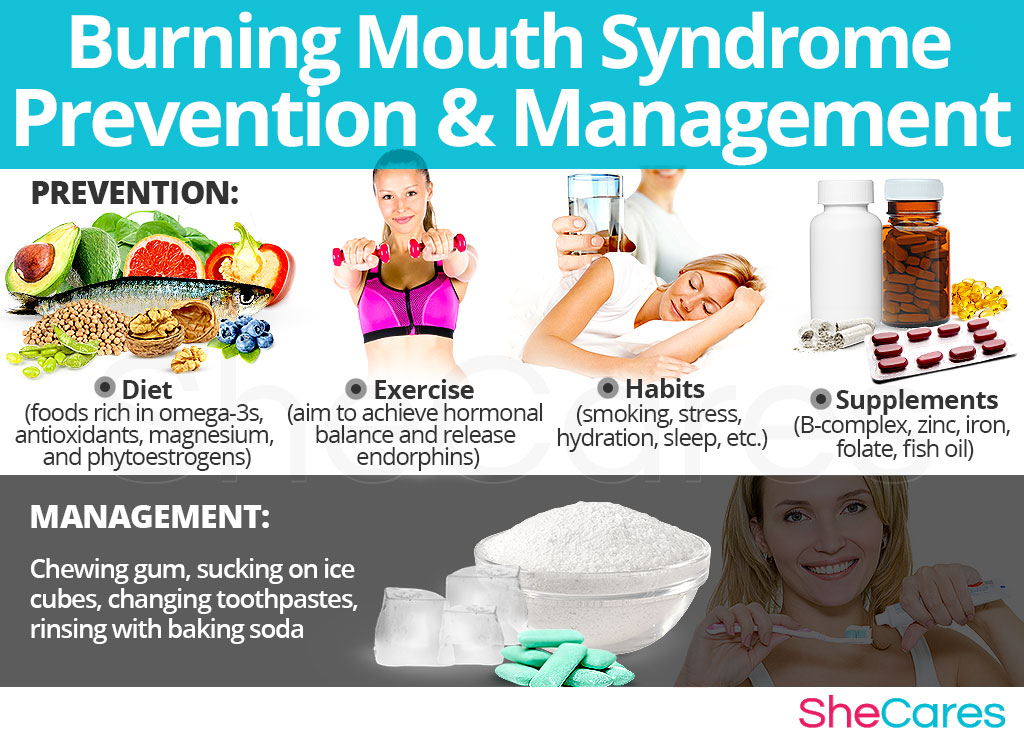
Treatments
Burning mouth syndrome can be so severe that the episodes start to affect everyday life. Luckily, finding an effective treatment method is within reach.
Three Approaches to Treat Burning Mouth Syndrome
Three levels of approaches can be reviewed for treating burning mouth syndrome depending on the underlying cause. These are categorized as: (1) Lifestyle Changes, (2) Alternative Medicine, and (3) Pharmaceutical Options.
If possible, women are encouraged to begin with the least risky approach, lifestyle adjustments, and then proceed to the next level of care based on their specific situation.
Lifestyle Changes
This first level of treatment involves the least amount of risk. On the other hand, it necessitates the highest amount of self-discipline. Often, simple changes in lifestyle can reap huge benefits in achieving a better level of health. Primarily, start with an enriched diet, consistent exercise, and healthy habits.
Although these changes will help promote over well-being, they are often not the most direct way to balance hormones, one of the leading causes of burning mouth syndrome in women. Further treatment may be necessary. Alternative medicine has demonstrated itself as a superb way of averting future episodes related to hormonal imbalance in a harmless and natural way.
Alternative Medicine for Burning Mouth Syndrome
Alternative medicines and supplements normally involve little to no risk and can be an exceedingly effective for treating burning mouth syndrome, depending on the root cause. In the case of herbal supplements, there are two main types to take into consideration: phytoestrogenic and hormone-regulating herbal supplements.
Phytoestrogenic herbal supplements
When a woman consciously introduces these plant-based estrogens into her body, these herbs - such as black cohosh - can help treat an estrogen deficiency causing burning mouth syndrome by supplementing the estrogen levels already present in the body.
For women undergoing the menopausal transition and those in postmenopause, phytoestrogens may serve as an effective treatment option because they are more likely to have low estrogen levels. However, phytoestrogenic herbs are not necessarily effective for women in other stages of life, such as pregnancy.
Hormone-regulating herbal supplements
These supplements, including Macafem, encourage the body's endogenous hormone production by supporting the pituitary and endocrine glands, helping the hormonal system work more capably. This results in the balance of estrogen as well as other important hormones, such as progesterone.
These hormone-regulating supplements can be considered the safest and most natural way to treat an underlying hormonal imbalance behind burning mouth syndrome and can be used throughout a woman's life as they support the body's natural hormone production.
Moreover, there are other types of herbal supplements that promote healthy nervous system functioning and, thus, may help in the alleviation of burning mouth syndrome.
A combination of approaches is usually the most effective route to take. Lifestyle changes combined with alternative medicine can ultimately help a woman overcome burning mouth syndrome caused by hormonal imbalances. However, for some women, the occurrence of burning sensations on the tongue will be so severe that more drastic treatment is necessary.
Pharmaceutical Options for Burning Mouth Syndrome
Interventions at this third level include the highest risk and often the highest costs. Consult with a trusted physician before beginning any pharmaceutical treatment or medication for burning mouth syndrome. Not all treatments are suitable for everyone.
There are two main types of pharmaceutical options that can be prescribed to treat BMS: hormone-regulating medication and antidepressants.
In sum, these three methods are not mutually limited. A woman may use different methods at different times or any combination of them, depending on her particular circumstances. Recently, more and more women find that dealing with burning mouth syndrome can be accomplished via a combination of healthy lifestyle and alternative treatments.
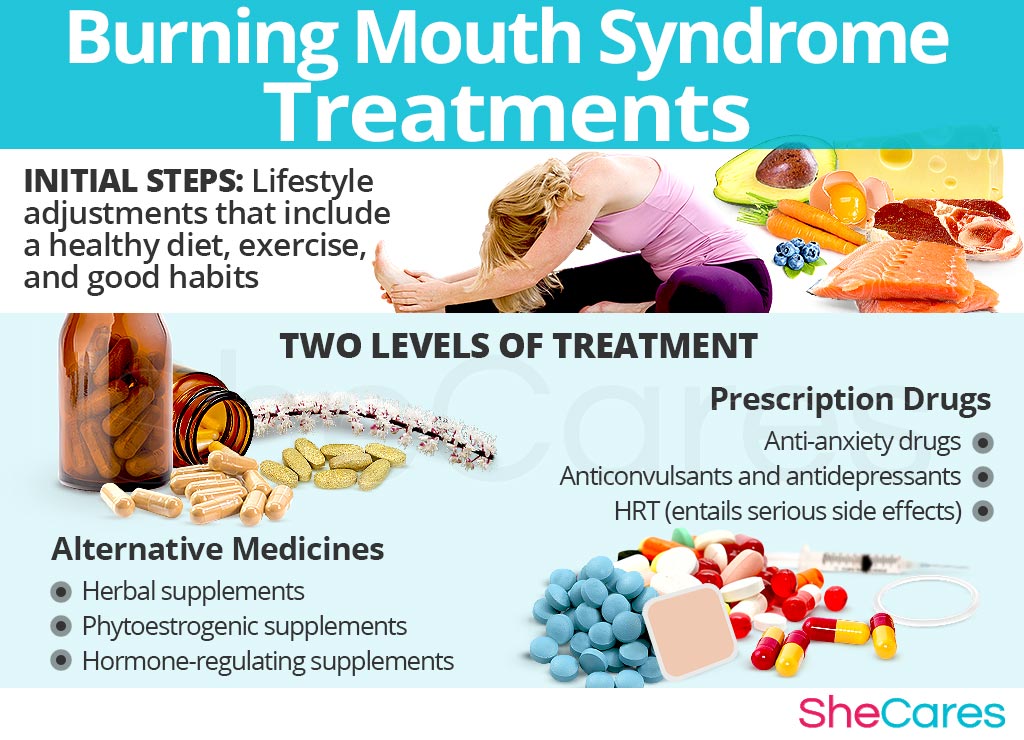
Sources
- Anxiety and Depression Association of America. (n.d.). Physical Activity Reduces Stress. Retrieved May 3, 2018, from https://adaa.org/understanding-anxiety/related-illnesses/other-related-conditions/stress/physical-activity-reduces-st
- Aravindhan, R. et al. (2014). Burning mouth syndrome: A review on its diagnostic and therapeutic approach. Journal of Pharmacy & BioAllied Sciences, 6(Suppl 1), S21-S25. Doi: 10.4103/0975-7406.137255
- Buchanan, J.A.G. & Zakrzewska, J.M. (2008). Burning mouth syndrome. BMJ Clinical Evidence, 2008, 1301. Retrieved May 2, 2018, from https://www.ncbi.nlm.nih.gov/pmc/articles/PMC2907957/
- Cleveland Clinic. (2013). Burning Mouth. Retrieved May 2, 2018, from https://my.clevelandclinic.org/health/diseases/14463-burning-mouth
- Femiano, F. & Scully, C. (2002). Burning mouth syndrome (BMS): double blind controlled study of alpha-lipoic acid (thioctic acid) therapy. Journal of Oral Pathology & Medicine, 31(5), 267-269. Retrieved May 4, 2018, from https://www.ncbi.nlm.nih.gov/pubmed/12110042
- Gurvits, G.E. & Tan, A. (2013). Burning mouth syndrome. World Journal of Gastroenterology, 19(5), 665-672. doi: 10.3748/wjg.v19.i5.665
- Harvard Health Publishing. (2008). Burning mouth syndrome. Retrieved May 3, 2018, from https://www.health.harvard.edu/newsletter_article/Burning_mouth_syndrome
- Mayo Clinic. (2017). Burning mouth syndrome. Retrieved May 2, 2018, from https://www.mayoclinic.org/diseases-conditions/burning-mouth-syndrome/symptoms-causes/syc-20350911
- Nasri-Heir, C. et al. (2015). Burning mouth syndrome: Current concepts. The Journal of Indian Prosthodontic Society, 15(4), 300-307. doi: 10.4103/0972-4052.171823
- National Institute of Dental and Craniofacial Research. (2018). Burning Mouth Syndrome. Retrieved May 4, 2018, from https://www.nidcr.nih.gov/health-info/burning-mouth/more-info#helpful-tips
- Petrusic, N. et al. (2015). The Effect of Tobacco Smoking on Salivation. Acta Stomatologica Croatica, 49(4), 309-315. Doi: 10.15644/asc49/4/6
- Slebioda, Z. & Szponar, E. (2014). Burning mouth syndrome – a common dental problem in perimenopausal women. Menopause Review, 13(3), 198-202. doi: 10.5114/pm.2014.43825
